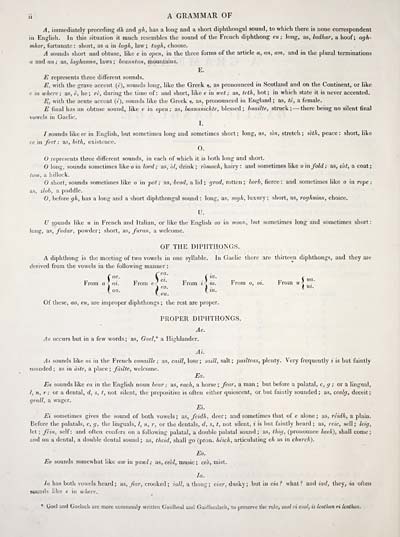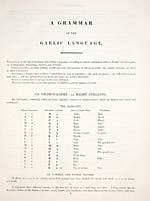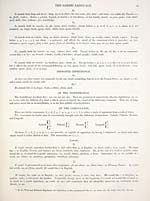Download files
Complete book:
Individual page:
Thumbnail gallery: Grid view | List view

ii A GRAMMAR OF
A, immediately preceding dh and yh, has a long and a short diphthongal sound, to which there is none correspondent
ill English. In this situation it much resembles the sound of the French diphthong eu; long, as, ladhar, a hoof; agh-
mhor, fortunate : short, as a in lagh, law ; tagh, choose.
A sounds short and obtuse, like e in open, in the three forms of the article a, an, am, and in the plural terminations
a and an ; as, laghanna, laws ; beanntan, mountains.
E.
E represents three different sounds.
E, with the grave accent (t), sounds long, like the Greek n, as pronounced in Scotland and on the Continent, or like
e in where ; as, è, he; re, during the time of: and short, like e in %vet ; as, teth, hot; in which state it is never accented.
E, with the acute accent (<•), sounds like the Greek >i, as, pronounced in England ; as, tc, a female.
E final has an obtuse sound, like e in open; as, beannnichte, blessed; buailte, struck; — there being no silent final
vowels in Gaelic.
I.
/sounds iikeee in English, but sometimes long and sometimes short; long, as, im, stretch; sith, peace: short, like
ce in feet ; as, bith, existence.
O.
O represents three different sounds, in each of which it is both long and short.
long, sounds sometimes like o in lord; as, ul, drink ; rbmach, hairy : and sometimes like o in fold; as, cot, a coat;
lorn, a hillock.
short, sounds sometimes like o in pot ; as, brod, a lid ; grod, rotten ; barb, fierce : and sometimes like o in rope ;
as, slob, a puddle.
0, before gh, has a long and a short diphthongal sound : long, as, sogh, luxury ; short, as, roghuinn, choice.
U.
U sounds like u in French and Italian, or like the English oo in moov, but sometimes long and sometimes short:
long, as, fudar, powder; short, a%, faran, a welcome.
OF THE DIPHTHONGS.
A diphthong is the meeting of two vowels in one syllable. In Gaelic there are thirteeji diphthongs, and they are
derived from the vowels in the following manner :
, rea. , •
From a\ni. From c < ^'' From i\io. From o, oi. From ii\ ,■'
f uo. I f lU.
\_eu.
Of these, ao, eu, are improper diphthongs ; the rest are proper.
PROPER DIPHTHONGS.
Ae.
Ae occurs but in a few words; as, Gael,* a Highlander.
Ai.
Ai sounds like ai in the French canaille ; as, caill, lose ; saill, salt; pailteas, plenty. Very frequently i is but faintly
sounded ; as in ùite, a place ; fàilte, welcome.
Ea.
Ea sounds like ea in the English noun bear ; as, each, a horse ; fear, a man ; but before a palatal, c, g ; or a lingual,
/, 71, r ; or a dental, d, s, t, not silent, the prepositive is often either quiescent, or but faintly sounded; as, cealg, deceit;
geall, a wager.
Ei.
Ei sometimes gives the sound of both vowels; as, feidh, deer; and sometimes that of e alone; as, rtidh, a plain.
Before the palatals, c, g, the linguals, /, n, r, or the dentals, d, s, t, not silent, i is but faintly heard; as, reic, sell; leig,
let ; fein, self: and often confers on a following palatal, a double palatal sound; as, thig, (pronounce heek), shall come;
and on a dental, a double dental sound ; as, theid, shall go (pron. hcich, articulating c/t as in church).
Eo.
Eo sounds somewhat like aw in yawl; as, ceul, music; ceo, mist.
la.
la has both vowels heard ; as, fiar, crooked ; iail, a thong ; ciar, dusky ; but in da ? what? and iad, they, ia often
sounds like e in where.
" Gael and Gaelacli are more commonly written GaiUIieal and Gaidhealacli, to preserve tlie rule, caol ri caot, is Icatlmn ri leatlmn.
A, immediately preceding dh and yh, has a long and a short diphthongal sound, to which there is none correspondent
ill English. In this situation it much resembles the sound of the French diphthong eu; long, as, ladhar, a hoof; agh-
mhor, fortunate : short, as a in lagh, law ; tagh, choose.
A sounds short and obtuse, like e in open, in the three forms of the article a, an, am, and in the plural terminations
a and an ; as, laghanna, laws ; beanntan, mountains.
E.
E represents three different sounds.
E, with the grave accent (t), sounds long, like the Greek n, as pronounced in Scotland and on the Continent, or like
e in where ; as, è, he; re, during the time of: and short, like e in %vet ; as, teth, hot; in which state it is never accented.
E, with the acute accent (<•), sounds like the Greek >i, as, pronounced in England ; as, tc, a female.
E final has an obtuse sound, like e in open; as, beannnichte, blessed; buailte, struck; — there being no silent final
vowels in Gaelic.
I.
/sounds iikeee in English, but sometimes long and sometimes short; long, as, im, stretch; sith, peace: short, like
ce in feet ; as, bith, existence.
O.
O represents three different sounds, in each of which it is both long and short.
long, sounds sometimes like o in lord; as, ul, drink ; rbmach, hairy : and sometimes like o in fold; as, cot, a coat;
lorn, a hillock.
short, sounds sometimes like o in pot ; as, brod, a lid ; grod, rotten ; barb, fierce : and sometimes like o in rope ;
as, slob, a puddle.
0, before gh, has a long and a short diphthongal sound : long, as, sogh, luxury ; short, as, roghuinn, choice.
U.
U sounds like u in French and Italian, or like the English oo in moov, but sometimes long and sometimes short:
long, as, fudar, powder; short, a%, faran, a welcome.
OF THE DIPHTHONGS.
A diphthong is the meeting of two vowels in one syllable. In Gaelic there are thirteeji diphthongs, and they are
derived from the vowels in the following manner :
, rea. , •
From a\ni. From c < ^'' From i\io. From o, oi. From ii\ ,■'
f uo. I f lU.
\_eu.
Of these, ao, eu, are improper diphthongs ; the rest are proper.
PROPER DIPHTHONGS.
Ae.
Ae occurs but in a few words; as, Gael,* a Highlander.
Ai.
Ai sounds like ai in the French canaille ; as, caill, lose ; saill, salt; pailteas, plenty. Very frequently i is but faintly
sounded ; as in ùite, a place ; fàilte, welcome.
Ea.
Ea sounds like ea in the English noun bear ; as, each, a horse ; fear, a man ; but before a palatal, c, g ; or a lingual,
/, 71, r ; or a dental, d, s, t, not silent, the prepositive is often either quiescent, or but faintly sounded; as, cealg, deceit;
geall, a wager.
Ei.
Ei sometimes gives the sound of both vowels; as, feidh, deer; and sometimes that of e alone; as, rtidh, a plain.
Before the palatals, c, g, the linguals, /, n, r, or the dentals, d, s, t, not silent, i is but faintly heard; as, reic, sell; leig,
let ; fein, self: and often confers on a following palatal, a double palatal sound; as, thig, (pronounce heek), shall come;
and on a dental, a double dental sound ; as, theid, shall go (pron. hcich, articulating c/t as in church).
Eo.
Eo sounds somewhat like aw in yawl; as, ceul, music; ceo, mist.
la.
la has both vowels heard ; as, fiar, crooked ; iail, a thong ; ciar, dusky ; but in da ? what? and iad, they, ia often
sounds like e in where.
" Gael and Gaelacli are more commonly written GaiUIieal and Gaidhealacli, to preserve tlie rule, caol ri caot, is Icatlmn ri leatlmn.
Set display mode to: Large image | Transcription
Images and transcriptions on this page, including medium image downloads, may be used under the Creative Commons Attribution 4.0 International Licence unless otherwise stated. ![]()
| Early Gaelic Book Collections > Blair Collection > Gaelic dictionary, in two parts > (24) |
|---|
| Permanent URL | https://digital.nls.uk/79284437 |
|---|
| Description | A selection of books from a collection of more than 500 titles, mostly on religious and literary topics. Also includes some material dealing with other Celtic languages and societies. Collection created towards the end of the 19th century by Lady Evelyn Stewart Murray. |
|---|
| Description | Selected items from five 'Special and Named Printed Collections'. Includes books in Gaelic and other Celtic languages, works about the Gaels, their languages, literature, culture and history. |
|---|

